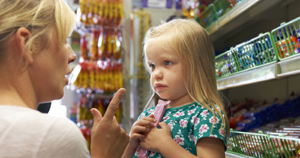Thursday March 30, 2023 | NATIONAL
by Mary P Brooke | Island Social Trends | FOOD SECURITY NEWS SECTION
If it is effective, this Act will help parents deal with their children’s grocery store checkout temper-tantrums.
It was introduced as a private member’s bill (these don’t often become law) by Liberal MP Pattricia Lattanzio (Saint-Léonard—Saint-Michel).
The Child Health Protection Act C-252 aims to amend the Food and Drugs Act (prohibition of food and beverage marketing directed at children).
Lattanzio spoke about C-252 in the House of Commons back in September 2022, saying it “aims to help the youngest and most impressionable Canadians maintain and improve their health by restricting the advertisement of certain foods to them”.
Back in mid-2021 the food industry launched the new Code for the Responsible Advertising of Food and Beverage Products to Children in mid-2021, with implementation slated for July 1, 2023. But legislators may push for more.
Bill C–252, a private member’s bill intending to amend the Food and Drugs Act to prohibit food and beverage marketing directed at children, will be studied by the House of Commons Standing Committee on Health in the weeks to come.
Dr. Sylvain Charlebois, a professor at Dalhousie University in the Agri-Food Analytics Lab, said on Twitter today: “Protecting our children from coercive food marketing should be a priority for everyone, including the government. But Bill C-252 is fixing a problem which doesn’t really exist, at least not anymore.” However, any parent who shops with a young child alongside who wants candy or junk food displayed at their eye-level in the grocery store may not agree.
Reasons for Bill C-252:
Here are the full remarks by Lattanzio about C-252 on September 27, 2022:
“Madam Speaker, I am pleased to rise in the House today in support of my private member’s bill, Bill C-252, known as the child health protection act, which aims to help the youngest and most impressionable Canadians maintain and improve their health by restricting the advertisement of certain foods to them. I am confident that hon. members in this chamber can agree on the harms that diets with excessive amounts of sugar, sodium and saturated fats can have on the health of Canadians.

Research has shown time and again that unhealthy diets with excessive consumption of these nutrients of concern are linked to a higher lifetime risk of obesity, high blood pressure, diabetes and other chronic diseases. We also know that developing healthy eating habits early in life is important to help protect children from developing these health problems in adulthood.
Each year, hundreds of millions of dollars are spent on food advertising in Canada by the food and beverage industry. Evidence shows that food advertising strongly influences children’s food preferences and consumption patterns. Children in Canada are exposed to thousands of food advertisements every year across their daily settings and, unfortunately, most of these ads are for foods that contain excess sodium, sugar or saturated fats.
Opportunities to advertise to children have expanded with television and digital media. Children today are more digitally connected than ever before. Their screen time has increased and advertising directly to them has become easier. Tackling chronic diseases and maintaining public health is a whole-of-society issue and everyone has a role to play.
Since 2007, some of the largest food and beverage companies in Canada have been self-regulating certain types of food advertising to children. Recognizing that the current self-regulatory initiative did not go far enough, some industry associations have recently introduced a code. The code outlines criteria that the food and beverage industry will use to determine which advertisements are considered primarily directed at children, and it is the same industry that will determine the nutrient criteria in order to assess which foods are subject to the self-regulatory restrictions.
Although the proposed code is a step forward, it clearly demonstrates that the industry acknowledges the health consequences that food advertising can have on children. However, let us be clear. We know that voluntary codes are not enough to tackle and solve the issue. The first challenge of solely relying on industry self-regulation is simply that they are voluntary in nature. This allows restaurants, food companies and advertisers to abstain from signing on or simply to withdraw their adhesion at their convenience.
Also, criteria used for these codes often omit to stipulate important advertising techniques, tactics and sources of exposure that are known to appeal to and/or influence children. There is also a lack of transparency in the enforcement of these codes with no enforceable sanctions for non-compliance and, more importantly, it does not provide an independent monitoring.
It is clear from experience that self-regulatory initiatives do not go far enough to safeguard the health of our children. Canada’s experience with industry-led self-regulatory initiatives have been similar to those of the United States, Australia, the United Kingdom and Spain. Research in each of these jurisdictions has clearly shown that self-regulatory marketing codes have limited impacts in curtailing children’s exposure to the marketing of food and beverage products. Consequently, the U.K. and Spain are pursuing new mandatory restrictions following the observed limited impact of self-regulatory initiatives. This government agrees and believes industry self-regulation is not enough to protect children from being exposed to the harmful and incessant advertising of certain foods.
The Minister of Health‘s mandate includes a commitment to protect vulnerable populations, including our children, from a range of harms, such as the stream of commercial messaging and endorsements that trigger the most basic eating instincts, especially for foods containing excess levels of sodium, sugars and saturated fats. Supporting Bill C-252 is well aligned with this commitment and will help address many of the shortcomings of the current landscape of the industry-led self-regulating codes.
Our children, just like the one that is in the gallery with us today, are our priority and concrete action is needed now in order to ensure that they are not subject to and do not succumb to the aggressive advertising of foods that contain excess levels of nutrients of concern and that pose unnecessary risks to their health and the health of future generations.”
==== ABOUT ISLAND SOCIAL TRENDS:
Island Social Trends is a long-standing publication in the west shore of South Vancouver Island (fourth in a series that began with MapleLine Magazine 2008-2010, Sooke Voice News 2011-2013, and West Shore Voice News 2014-2020, which then emerged as Island Social Trends in mid-2020).
Island Social Trends editor is Mary P Brooke, B.Sc. (Foods & Nutrition), Cert PR. She is a long-time journalist and editor, delivering news through a socioeconomic lens.
Island Social Trends continues to build the Island Social Trends Food Security Archive with articles about current developments around food sustainability in BC.
IslandSocialTrends.ca covers news of the Greater Victoria area and south Vancouver Island, with insights on BC and national issues.
Ms Brooke has consistently covered progressive politics on Vancouver Island including a focus on food security for the South Vancouver Island region. She has presented detailed coverage of the SD62 School Board and its committees since 2014.








